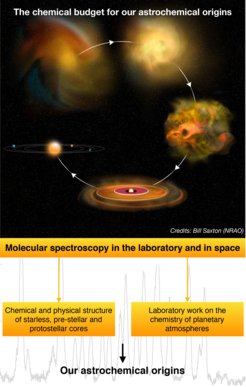Max Planck Research Group for Silvia Spezzano
This autumn, Silvia Spezzano will start her new Max Planck Research Group (MPRG) at MPE. Over the next five years, she will study the chemical link in-between different stages of star and planetary system formation, and provide crucial constraints to our astrochemical origins. MPRGs are a key part of support of junior scientists in the Max Planck Society, offering internationally competitive packages for personnel, start-up money, and yearly operating costs.

With her MPRG, Spezzano will try to unveil the chemical link in-between the different stages of star and planetary system formation depicted here. The background spectrum is from interstellar gas and contains many molecular lines.
One of the biggest challenges in modern astrophysics is understanding the origins of life on Earth. The gas composing the interstellar medium (ISM) is at the same time the “exhaust” from old stars and galaxies and the material that feeds the birth and growth of new galaxies, new stars, and eventually new planets. Understanding the chemistry that drives star and planetary systems formation is crucial to understanding the phenomena itself because the chemical and physical processes in action are deeply interconnected.
Silvia Spezzano will use a multidisciplinary approach over the next five years to study the physical and chemical structure of star-forming regions, through laboratory spectroscopy, observations, and radiative transfer modelling. The MPRG builds up from the work Spezzano started with her Minerva Fast-Track fellowship in 2017.
In order to observe molecules in the ISM, and use them as tools, high resolution laboratory data is mandatory. In the field of astrochemistry, observations and laboratory work have a symbiotic relationship, and the CAS laboratories at MPE are unique worldwide. Spezzano’s group will study molecules of astrophysical importance in the laboratory, and subsequently observe them in the ISM to unveil the molecular complexity in space.
Silvia Spezzano obtained her Bachelor and Master Degrees in Industrial Chemistry from the University in Bologna. After a short stay as predoctoral fellow at Harvard University with a fellowship from the foundation “Toso-Montanari”, she went to the University of Cologne and the Max Planck Institute for Radioastronomy for her doctoral studies, which she finished in 2013 with magna cum laude for her thesis “Elusive molecules in the laboratory and in space”. In 2014, she was awarded with the “Lucia Padrielli” prize for young female astronomers from the Italian National Astrophysics Institute and Italian Astronomical Society. At MPE, she started in 2015 as a Postdoc, where she got a Christiane Nüsslein-Volhard Foundation fellowship in 2016 and her Minerva Fast-Track fellowship in 2017.












